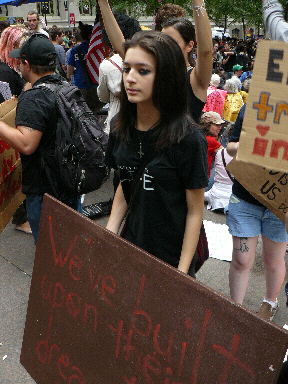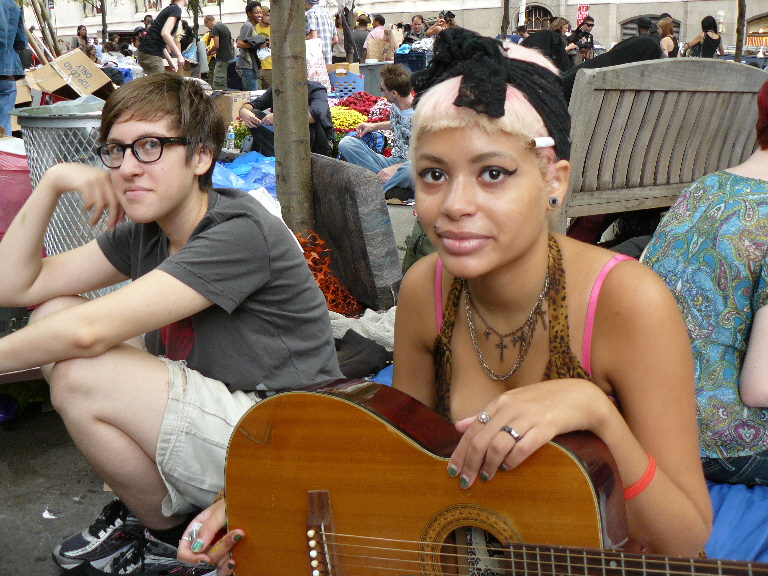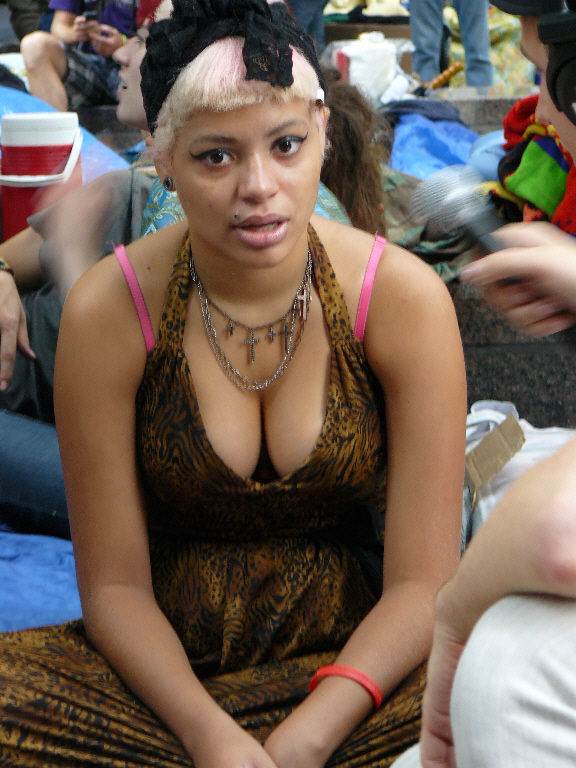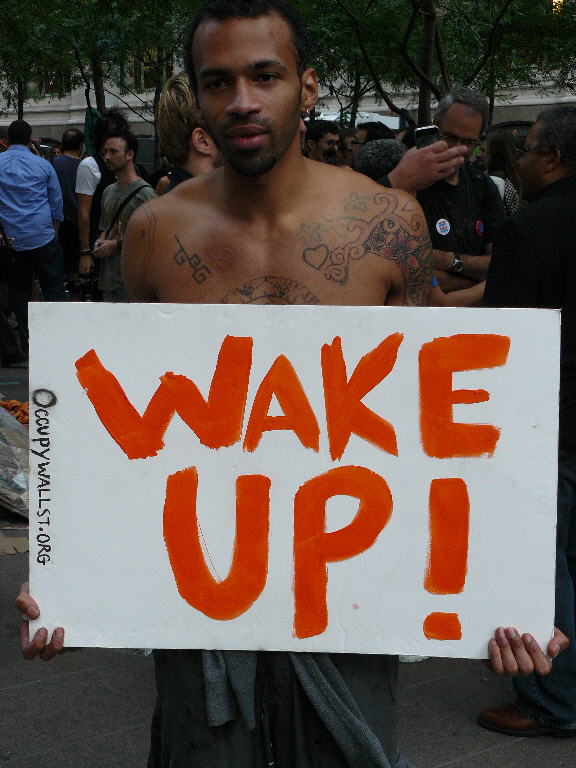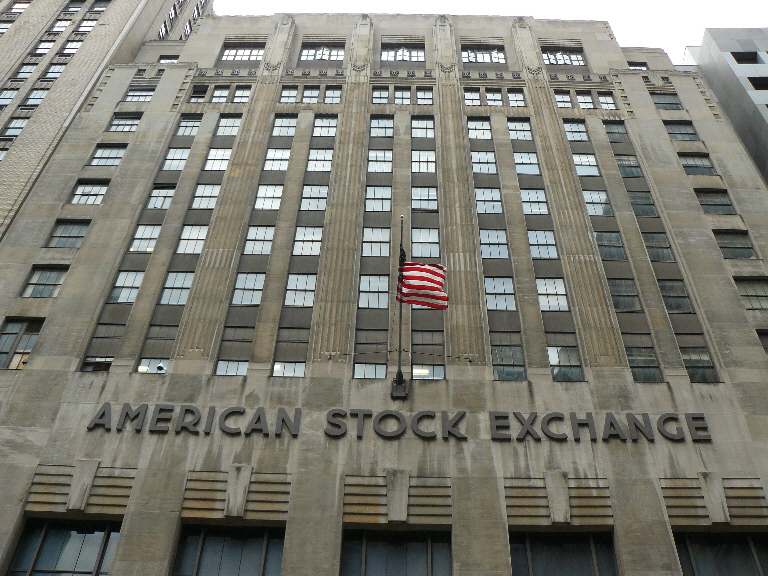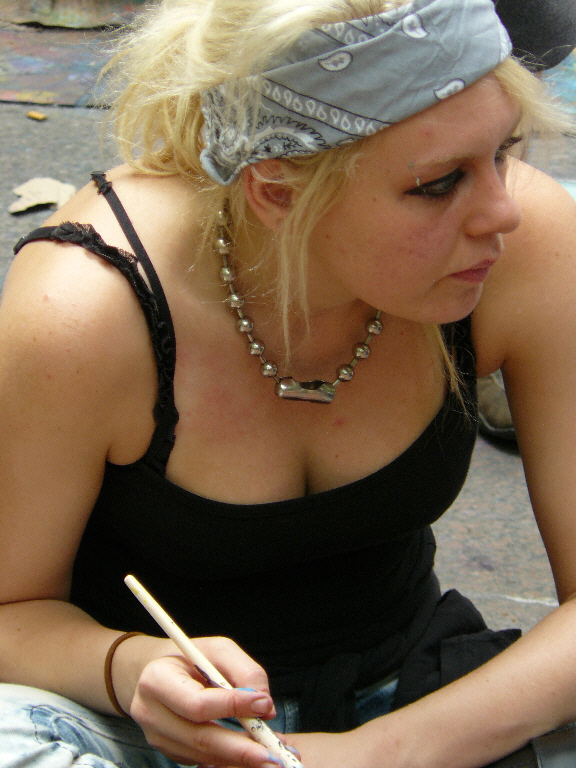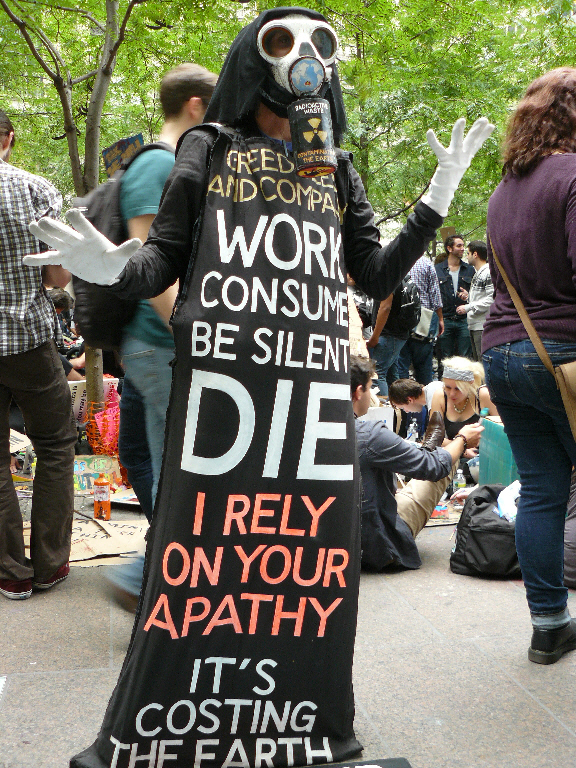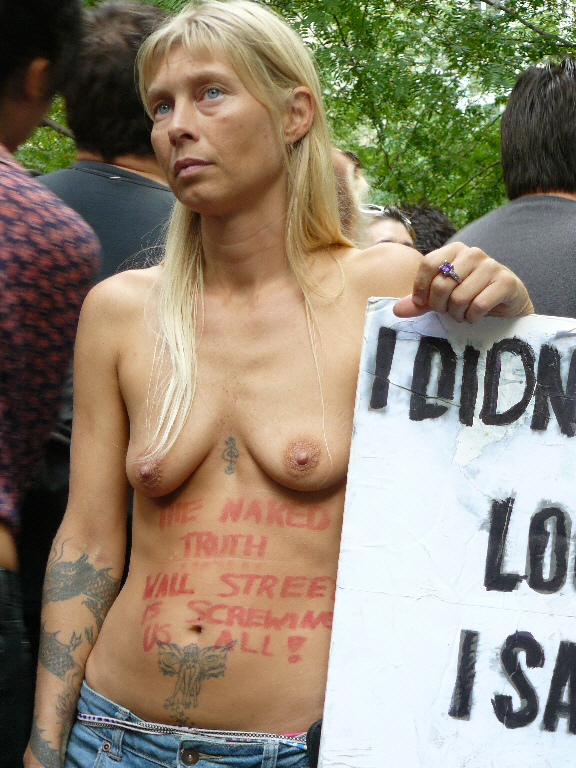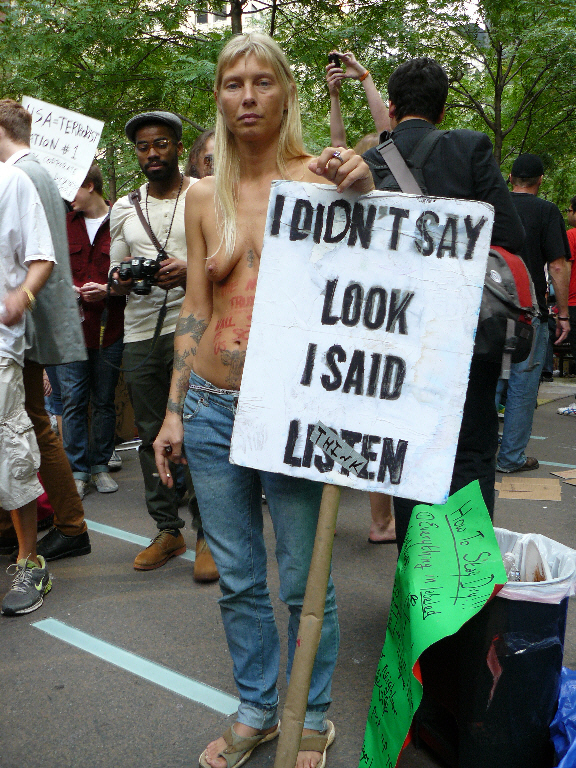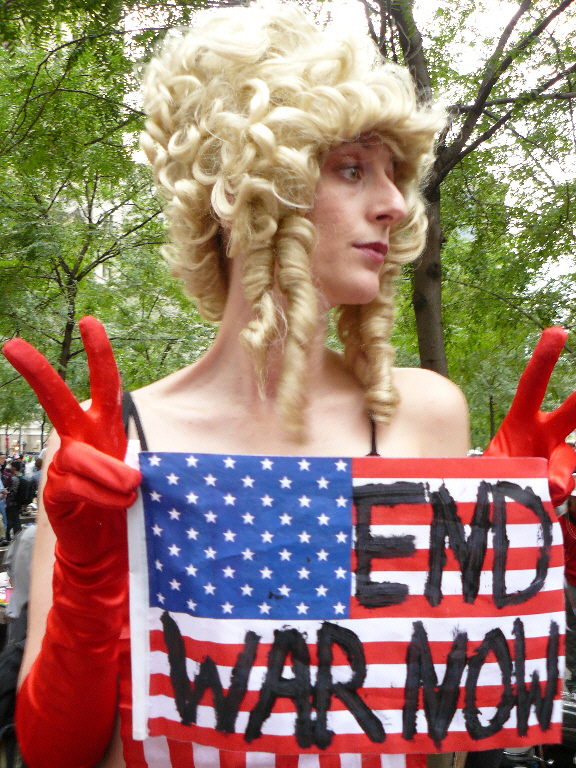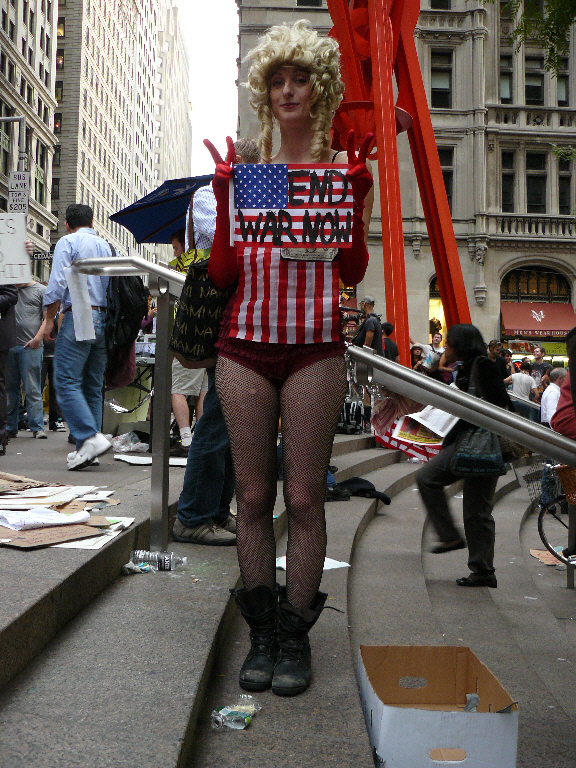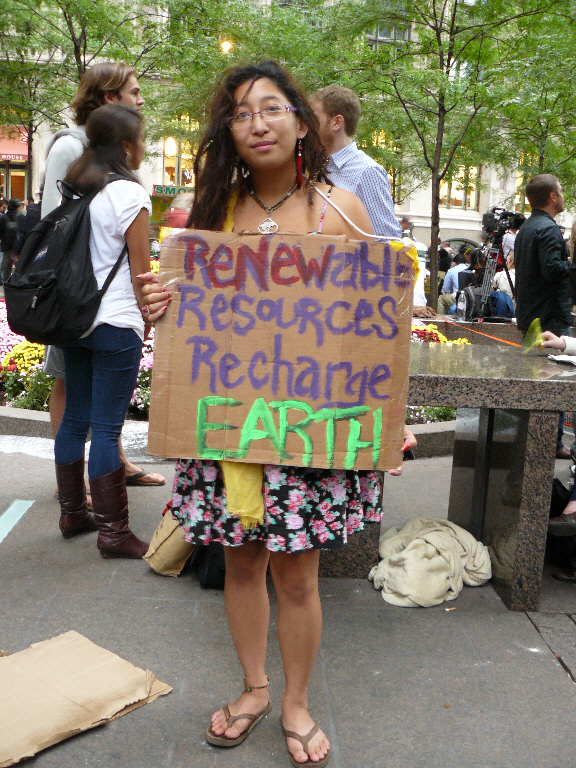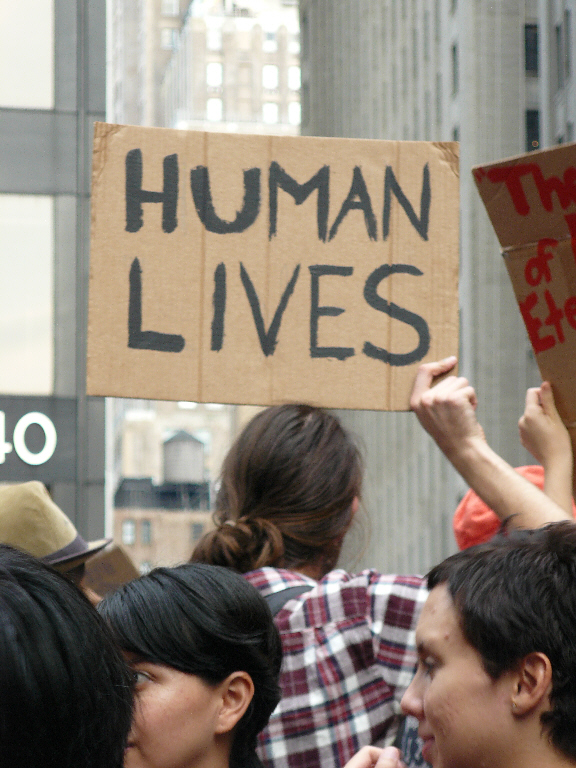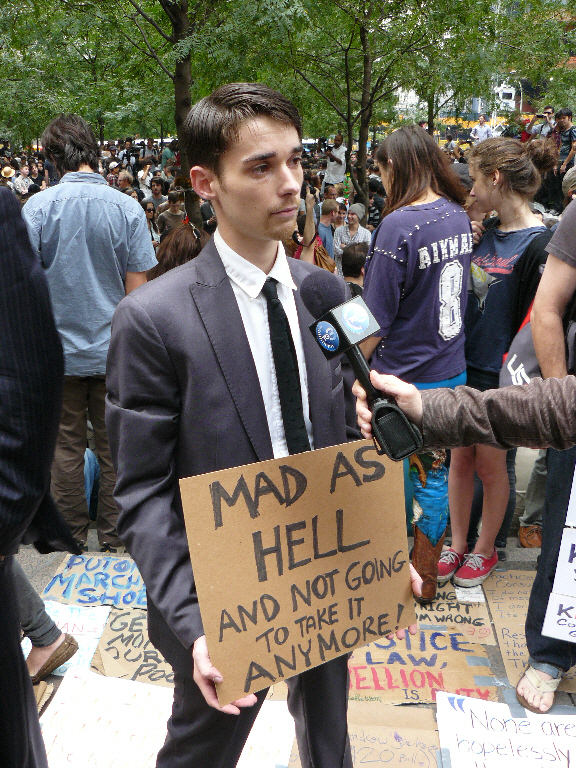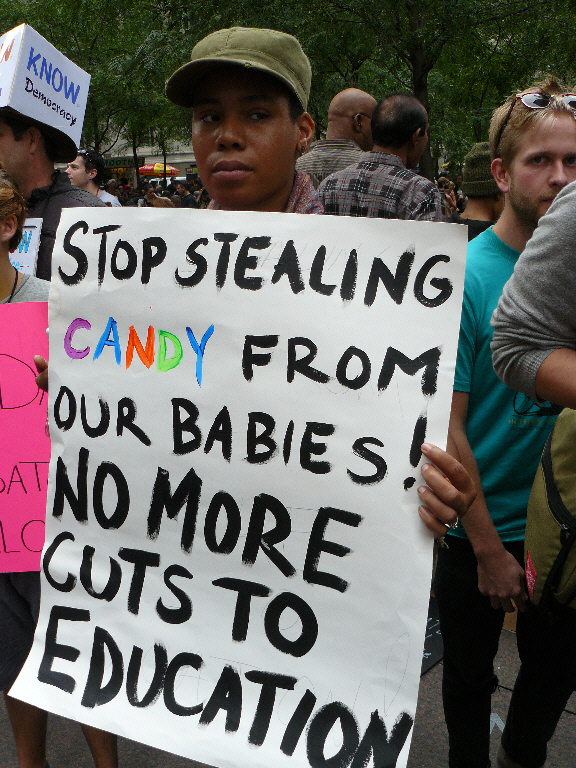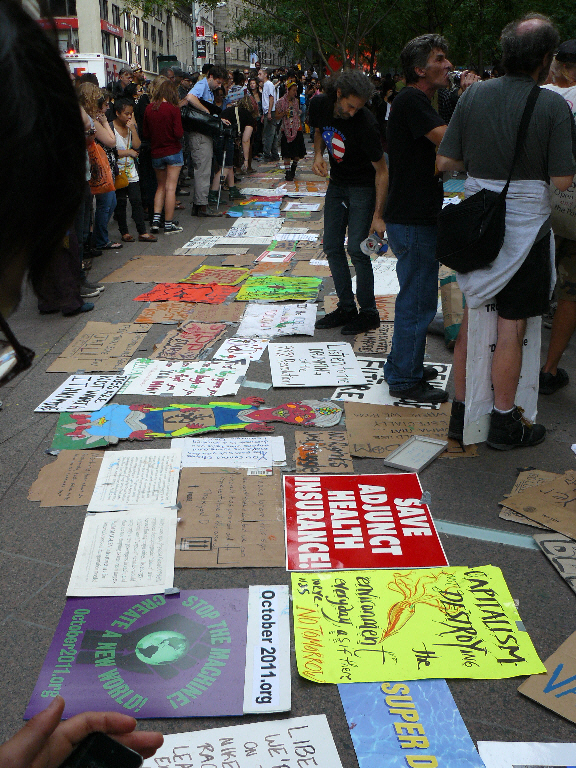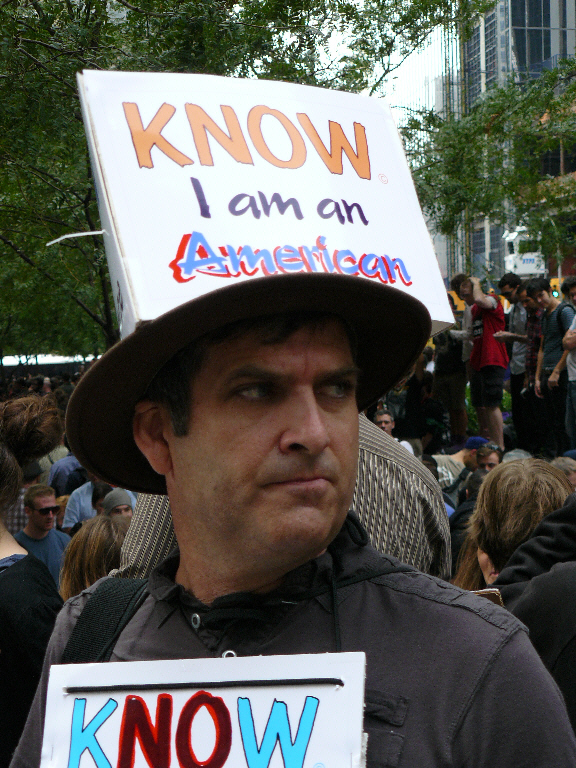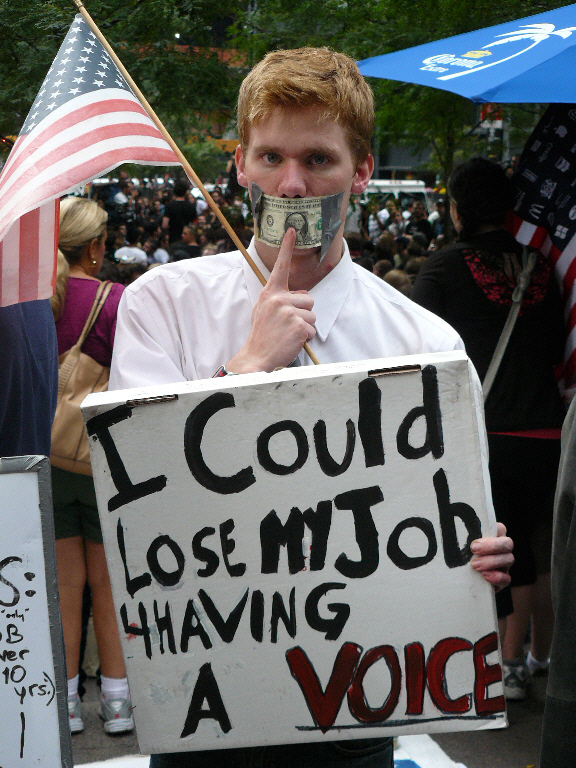|
In-depth interviews with the protestors from Liberty Square, Manhattan, conducted on 30 September 2011 by Rob Couteau
|
|
| | |||||||||||||||||||
| In their own words, here are a few of the dedicated men and women who have sacrificed their time and energy to provoke change in America and in the world at large. As I wandered through the crowd, I selected them at random and invited them to participate in this group interview. I present these conversations as they actually occurred, edited only for grammar. I have included each and every person that I spoke with that day. While the major media continues to put words in their mouths and to spin the story every whichway, this is the only lengthy text interview of actual participants that is currently available. Beyond any political analysis or interpretation, perhaps the most notable thing about all this is the unique atmosphere that has been created in this small park in New York. As you descend the broad steps into the partially sunken esplanade, you feel as if youíre entering a place far away from the hectic, frenetic, cold, and anonymous atmosphere of the city. The generosity, sincerity, devotion, and love of these young people is contagious. This is the Woodstock of our times: on a much smaller scale, yet one that will certainly grow larger as it spreads across the nation. They have already accomplished something that no one can take away, distort, or destroy. They have incarnated the spirit of a truer, more just, more vital America. This is a new historical stepping stone, and it will serve as a focal point for all those who care enough to extend their will and fight for real change in the world. Ė 4 October 2011 * * * I arrived for my first visit to Liberty Square at 3 p.m. on Friday, 30 September: the fourteenth day of the occupation. Upon entering the park, I noticed two young women, Pearl and her friend Willa, seated on a mattress and politely answering questions from passersby. When I asked if they would participate in an interview, Pearl laughed and said that it was her fourth one in a row.
Rob Couteau: Where are you from? Pearl: Queens. RC: So why are you here today? Pearl: Iím here because I want to join the cause and to move toward having an actual democracy, instead of a big sort of oligarchy kind of thing: that the rich rule the majority of the people, instead of the people ruling themselves. And thatís whatís happening. Iím not trying to be some sort of anarchist person. I just want regular people like you and me Ė who actually have ideas and want to better the society Ė to have a shot at being one of the top. Instead of, you know, you might not know much, but, if you have a lot of money, thatís how you get the success you get. RC: How old are you? P: Iím seventeen. RC: Is this your first protest? P: Yes. RC: There are so many students and so many universities in New York. Where are they? Why arenít they here? There should be tens of thousands of people here! P: I think there are a lot of people my age here. RC: Oh, most of the people here are probably around your age. But Iím saying there should be tens of thousands. Why arenít they here? P: There should be, absolutely. My mom doesnít know this is going on. My dad doesnít know this is going on. A lot of people in my neighborhood donít know this is going on. I donít think that the country wants to admit that thereís a serious problem. And other countries know whatís going on; other countries are supporting us. But I think our country should really start coming together. There are other ďOccupyĒ places. In D.C., for example Ö RC: Itís in over sixty cities now. Willa: Yeah. Also, weíre young. We have many more years that weíre going to be here. And itís going to be getting worse and worse unless we do something. Pearl: And we donít want it to get worse. We want it to get better. When I graduate college, itís going to be one job to twelve people. And thatís because of the economy. Thatís because of the people that are actually ruling the country. They have no idea what theyíre doing.
RC: One of the things that the media has criticized is that thereís no clearly defined goal in this protest. And I think thatís the beauty of it. Itís a shaggy dog. And everything that you guys have done that was supposedly ďwrongĒ has turned out right. For example, you didnít have a permit to march. And I think the New York Civil Liberties Union, or some group in New York, offered to help you get a permit, but nobody responded. And, as a result, Officer Anthony Bologna spray peppered that person, and this galvanized more media attention. And the fact that thereís no clearly defined goal is creating an instant coalition. What do you guys think? Pearl: Yes, certain things that happened that werenít so great actually did help to put this whole thing together. People have been coming just because they heard about the pepper-spray incident. And they think itís wrong. And they want to support it. They want to be part of something. Willa: I think there are a lot of things that should be protested, because there are a lot of things that are wrong right now. And itís good to be open. Somebody who doesnít care too much about the economy but really wants equal rights for everyone can come down and not feel like they donít belong here. Pearl: Yes. Because this is a big thing that everyone wants to accomplish. Theyíre not going to keep anybody out just because theyíre representing something different. If you have a certain cause, you can come down here and, hey, youíre going to be one more person in the march. So, you know, weíre not turning anybody away. RC: In terms of strategy, how about opening up a second site, in case the police clear this site out? Pearl: I heard that if this site gets too crowded, theyíre going to move it onto another block. And theyíre just going to do the same thing. And weíre not going to leave. Weíre not going to stop. Weíre just going to move on to the next place, and continue the peaceful community protest that weíre trying to do. Weíre trying to be self-sufficient, self-sustaining, peaceful. There are no drugs allowed here. If youíre going to do drugs, youíre going to have to do it somewhere else. Everyone is in a united consensus about that. RC: Is there any strategy if and when agent provocateurs do show up and create violence and give the police an excuse to crack down, as happened in Seattle? Pearl: I think every person here is on the lookout for that. If we see that somebodyís acting out of line, we will ask the police to escort that one person out. So, nothing major has happened. There have been a few people, but theyíre easily pushed out. * * * Next I approached Zain, a wiry man in his late thirties, who was holding a sign that read, ďWake Up!Ē RC: I love your sign. For me, this is the whole problem. Everyoneís been asleep since the days of the last great protest marches in the late 1970s. Zain: Everybodyís been asleep since the beginning of business incorporation. And turning people into numbers. Thatís when everybody went to sleep. Currency is pointless. We have enough resources to live on this earth peacefully, and to be abundant. All we need is the earth; a couple of seeds; some water, and people. And we have that. We donít need all this shit.
RC: How long have you been down here? Zain: I just came here yesterday. But Iíve been following it since they started on September 17. RC: Where are you from? Zain: I was born in the Bronx. I came down from upstate: Middletown, New York. RC: How long are you going to stay here? Zain: Indefinitely. RC: Good for you. Anything you want to add? Zain: Just wake up; love; think about whatís important; let go of the fear. * * * Phil was dressed in a hooded black robe and rubber skull mask and stood beneath a tree holding a scythe: garbed as the classic messenger of death. RC: So why are you here? Phil: Despite having a full-time job, I sympathize with whatís going on. For the last ten years, the economy is really in trouble. More and more people are getting laid off. Jobs are being shipped overseas. Our currency is devaluating at a rapid pace: almost at a weekly pace, for that matter. And jobs arenít coming back from overseas; thatís for sure. Also, there are only a few people that are benefiting with the economy that we have, and the rest of us are being put in the back seat.
RC: Thatís why itís the ninety-nine percent, right? Phil: Yes. Exactly. RC: How many days have you been here? Phil: This is my first day. RC: You went to a lot of trouble on your first day with this costume! RC: I must have lost about two pounds so far, from sweating. But itís worth it. Iím glad to be here. Iím glad to share our experiences and to share the message together. Because, really, the more we send the message, the better off weíre going to be. RC: Where are you from? Phil: The Upper East Side of Manhattan. RC: How many days are you going to stay? Phil: Iíll be here today, tomorrow, and next week as well. But since I have a full-time job, Iím not here as often as Iíd like to be. Because I care. RC: What kind of work do you do? Phil: Iím a concierge and also a self-published author. I publish science fiction, faction, novels.
RC: How old are you? Phil: Iím forty-four. RC: Itís been a long time since this country has seen any serious kind of protest movement: maybe not since the 1970s. Is this the start of something big? Phil: The strange thing is, itís happening all over the world. Itís happening in Spain, Greece, Israel, Egypt, and Tunisia. Itís almost like a domino effect. And now, thereís going to be a rally in Los Angeles. And I think thereís something starting in Miami. RC: Thanks for talking with me. Phil: Any time! * * * Benny was dressed in one of the most elaborate costumes in the park: a gas mask and a black robe that bore the message: ďWork, Consume, Be Silent, Die. I Rely on Your Apathy.Ē A visitor from Australia, heís a dedicated antinuke activist and is committed to shutting down Indian Point nuclear power plant.
RC: Why are you here? Benny: Iím here for a number of reasons. First of all, thereís a rally tomorrow, a no-nukeís rally, which is really crucial, because we just had Fukushima. And Indian Point, up the road, is leaking, and itís ticking away. In a few years time, we want it decommissioned. Otherwise, itís probably going to be going on for another thirty years, and the risk is high. We could have a Fukushima here any time, in New York City. So, Iím raising that and the rally. And also, weíve got to change our ways. This whole occupation here is to wake people up; theyíve got to act. Each one of us is very important. Weíre taking that information, and weíve got to change their attitude toward the whole. Weíve got to be holistic about the effect we have on the planet Earth, and for future generations, because itís a crisis point now. Itís time to get out there. RC: Iíve had a big intuition from the start of this that itís absolutely now or never. Benny: I feel, well, itís now. I mean, there is no never. Itís just now. RC: I mean, this rally has to take off or else the country is never going to wake up. Benny: This is good. Itís a wake up call, absolutely. Itís a ďscreaming outĒ by scientists. Environmental people all over the world have been saying it for ages. And now, young people. Thereís a rise of the movement, and, basically, thereís a transition point, hopefully, that gets the people heard. And through all of this, we move toward sustainable energy. Hopefully, all these financiers out here will start directing their energies Ė their financial energies Ė to help transform this planet, and to heal the planet and all the beings that live on it. Because at the moment itís dying, because of the culture thatís developed up till now: the consumerist culture. And now, weíve got to think in terms of how we get back to the earth. RC: Our psychic energy has to be refocused and channeled to this theme. Thatís really what youíre saying. Benny: Yes. RC: How old are you, and how long are you going to stay here? Benny: I turn sixty-six tomorrow. If the energyís good, Iím going to stay here for a while. * * * Zuni was hard not to notice, as she seemed to be everywhere at once, interacting with the various groups that composed the core of the Liberty Square movement. She was also walking around topless and was surrounded by passersby bearing startled expressions.
RC: How old are you? Zuni: Iím thirty-seven. RC: Why are you here? Zuni: A lot of reasons. I donít even know where to start; there are so many issues. But my basic reason for being here is for equality. Not just for this country but for everyone in the world. There are enough resources to go around. It doesnít have to be like this. There doesnít have to be people starving on the side of the street or cold every night. It doesnít have to be like that. RC: Where are you from? Zuni: Jersey. RC: How long are you going to stay? Zuni: As long as it takes. RC: Have you been harassed by the police for walking around topless?
Zuni: No. RC: How long have you been doing that? Zuni: Since day one. Fourteen days. RC: Why do you think they leave you alone? Zuni: Because itís not against the law. RC: Why are you doing it? Is there a reason? Zuni: To exercise my rights before I lose them. We live in a police state, so we have to exercise all our rights or they take them away, slowly. Sweep it under a rug; next thing, itís gone. RC: Anything you would like to add? Zuni: If people want to come down and join us, that would be awesome. We need all the people we can get if weíre really going to take Wall Street down. RC: Speaking of that, why do you think there are so few people here, considering the fact that weíre surrounded by major universities in New York? If this were 1968, all those universities would be emptied out. There would be tens of thousands of people here. Zuni: Because education today is actually indoctrination. I feel a lot of these people are indoctrinated. And theyíre just comfortable enough not to get up off their asses and do something about it. RC: Is it selfishness? That theyíre more concerned about the ďA-plusĒ? Zuni: Yes, I think so. But capitalism doesnít work. Weíve seen that. RC: Is there a lack of empathy in this generation? Zuni: I think there is a lack of empathy, yes. And this generation, these kids didnít ďgo outside and play.Ē When we were kids, we went outside and played. These kids sit in front of the TV, or the video game, or whatever. So, theyíre kind of in their own world anyway. RC: Theyíre victims of an electronic hallucination produced by corporations. Zuni: Yes. * * * One of the most articulate and devoted activists whom I had the pleasure of meeting that day, Yvonne wore a blonde Marie-Antoinette wig and an American flag blouse. The stars of the flag were covered with three horizontally placed dollar bills. She also donned red satin shorts and black fishnet stockings.
RC: I love your outfit. Yvonne: Thank you! RC: Where are you from? Yvonne: Washington Heights. RC: How many days have you been here? Yvonne: Iíve been here, on and off, since the very first night. I slept out here the first night, and Iíve been coming back every day that I can. Every morning, every afternoon, every evening that I can actually make time to come out here. I wish I could be here full-time; I really wish I could. RC: What else do you do? Yvonne: Iím an actress and a playwright. But currently, as a job, I work for a wind farm; I promote wind energy. Switching New Yorkers over from coal and nuclear to wind. Thatís part of my activism as well. So, Iím pretty much a full-time activist. RC: Where are you from? Yvonne: Iím born in Smithtown, Long Island, but I grew up in Tampa, Florida. RC: How old are you? Yvonne: Iím twenty-eight. RC: Whatís the main reason that youíre here? Yvonne: Iím here for a lot of different reasons, much like everyone else. But to be specific, corporations control our government; they control our politics. The government does not protect the people. As a matter of fact, it has become the exact opposite. And what I mean by that is, just to give a very specific example: the BP oil spill poisoned the Gulf of Mexico about a year and a half ago. Hundreds of thousands of people have been poisoned by that spill. A lot of people have died. A lot of people have been terminally ill ever since. Children have died. I mean, it is utterly insane. The media is not talking about it. The media will not talk about it. Because if any reporter were to actually come out and break the story on national news, it would be utter chaos. Because over six million people swam in that gulf since the oil spill. Six million people came into contact. And thatís from looking at the touristsí stats and the Census Bureau. So, just to give a very specific example: BP poisoned the Gulf of Mexico; they made a lot of money off that accident. And the people of the Gulf have been injured; theyíre poisoned. And our government is protecting BP, because they are controlled by BP, partly, and by the big oil, and by the big coal. Itís just insane; itís gotten out of control. RC: Itís one of the most disgusting unreported stories. Yvonne: Yes, itís one of the most disgusting unreported stories: that, and all the insider trading that went on prior to 9/11. I know people donít want to talk about it; itís a very hard topic to discuss. There was a lot of insider trading leading up to 9/11. In fact, the 9/11 first responders were also exposed to toxic chemicals, and they are dying, and they are not getting their medical expenses paid for. I do not want my money to go toward war. I want my money to go to people who stood up and went to clean up the Gulf of Mexico or to clean up the World Trade Center. Thatís where I want my money to go, not to the war. RC: A lot of the Establishment Left has voiced the opinion that the protestors need to pick a specific issue. But I feel that what theyíre doing is much smarter than that. By having no specific issue, itís created an instant coalition. Yvonne: Yes. No command; no one goal. I like to say that there are no rules in the revolution. In any revolution that has ever happened, there were people who were fighting for a lot of different reasons. There are no rules in the revolution. RC: So you feel that itís attracting many more people than it would if there were just one specific goal? Yvonne: Yes. There are people that come here for different reasons. Iím here specifically to revoke the rights of corporations. To get corporate money out of politics. To revoke their rights and to hold corporations accountable for their crimes against humanity. There are people here that are only pissed off about the fact that weíre at war. There are people that are only pissed off about the fact that Troy Davis was murdered. There are people that are only pissed off about the fact that theyíre unemployed or have student debt. But, in the end, it all goes back to corporate greed and corporations controlling our government, and there being no real regulation in our government. Our politicians are not protecting us. They are doing the exact opposite. They are only protecting the corporations.
RC: Can you say a few words about the outfit youíre wearing? Yvonne: As I said, Iím an actress and a street performer. Iím wearing an American flag, and the flag is backward. Dollar bills are covering up the stars, because Americans are consumers, and corporations look at America as a dollar sign. Every child that is born is going to be x-amount of dollars for each individual corporation. Weíre just a symbol of money; weíre consumers. So, I have three one-dollar bills upside down. The flag is backward and upside down, because America is backwards and upside down. Iím wearing a Marie-Antoinette wig, because the wig symbolizes the French Revolution, which was also a class war. And I have a little flag that says ďEnd War Now.Ē Because, again, I donít want my tax dollars going toward war. I want my tax dollars going toward things that really matter in America. And I wish everyone here would join the ďEnd War NowĒ cause, because a lot of our problems are rooted to the fact that we spend over a trillion dollars of our taxes on war. * * * While poking through donations in the ďOccupy Wall Street LibraryĒ Ė an eclectic assortment of literature stacked in cardboard boxes that includes works by Aeschylus, Aristotle, Shakespeare, Henry James, and Paul Ceylon Ė Melissa handed me a book titled An Atlas of Radical Cartography, saying, ďI was going to read it, but maybe youíd like to read it first.Ē Then I noticed her sign, which read: ďRenewable Resources Recharge Earth.Ē RC: How old are you? Melissa: Iím twenty-one. RC: Where are you from? Melissa: I came from Virginia. RC: And why are you here today? Melissa: Actually, there are a multitude of reasons. Iím here because renewable resources are hard to get. Or health care. I mean, look all over the world. There are so many countries that have access to health care. Here, it costs so much just to fix a minor fracture. And thatís disappointing, when we have all the doctors available. RC: This could be the spark not only for a nationwide protest but also for a new 1960s-like movement. Do you think this will happen?
Melissa: Hopefully. Well, itís already started to happen. If you look at the map over there, thereís a bunch of protests all over the country. The numbers are growing, and people are starting to realize and to open their eyes. And to shy away from all these biased views that are shown through media, such as CNN or Fox News. RC: Where are you staying? Melissa: Here, this is my home! RC: How many nights have you slept in the park? Melissa: Two out of the last three. RC: Whatís that been like? Melissa: Difficult to sleep. If youíve ever heard of Chinese torture methods, they use a water-drip method to torture their victims by dripping water on the forehead incessantly. So, feeling rain all over your body is keeping your body in alert all night, and finding sleep is difficult. RC: You have a sleeping bag? Melissa: Yes. RC: Did you arrive here alone or with a friend? Melissa: I came with a friend, but he returned to D.C. today so that he could start the protest back home. But this is really where the action is; heís missing out. [Laughs] RC: Where is your family from? Melissa: Vietnam. My grandfather was an ambassador from Indochina to Burma. Luckily, we were able to get out of the country before the war. * * * Lamar was walking through the park with some friends and carrying a sign that simply read, ďHug Me.Ē RC: How long have you been here? Lamar: This is my second time coming. I came last week, on the day of the Troy Davis march. RC: Whatís the ďHug MeĒ thing about?
Lamar: I found this sign, and I thought it was very appropriate. Itís a good message. Some people need to be hugged; do you know what I mean? RC: It is a good message, yes. Empathy. Lamar: Right. Itís also all about solidarity: human solidarity. I feel this sign embodies that. So, I just went ahead with it. RC: Whatís the main reason youíre here today, besides hugging people? Lamar: I think most of us are here because of the economic situation in the country and in the world. As you know, basically, a lot of people on Wall Street, we bailed them out. And theyíre not being held accountable for all the money that they got. RC: We bailed them out, and now weíre being told we have to ďcut back,Ē even though this country is awash with money. The top one percent has more money than ever, right? Lamar: Exactly. That is my main reason. I think the whole money system is horrible. The way money is created is horrible. And the whole system is made so that there are always poor people. And I suppose thatís OK, as long as the people have what they need. But that is not the case. And when that happens, then this happens. RC: How old are you? Lamar: Iím twenty-eight years old. RC: Where are you from? Lamar: Iím from Panama. RC: And where do you live now? Lamar: I live in Brooklyn, in Bed-Stuy. RC: Thatís why they say that all roads lead to Brooklyn! How old were you when you arrived from Panama? Lamar: [Laughs] I was seventeen, a couple of days before turning eighteen. RC: Many of the establishment leftwing groups in New York are criticizing this protest. Theyíre saying you should pick one thing to focus on. But I think itís brilliant that there isnít one thing. Because now you have an automatic coalition, which is of interest to everyone. This is the ninety-nine percent that is getting screwed over in the country. Do you agree? Lamar: I do agree with that. For example, the first time I came, on the day of the Troy Davis march, it was a little confusing, because there was a Troy Davis March and then there was also the Ninety-nine Percent March. And then, the two things joined. And it got limited coverage; not a lot of people knew about it. But I think it was beautiful, how people were helping each otherís issues. And this is also part of whatís going on here. A lot of it is about solidarity. I understand where theyíre coming from. Itís not like I donít see their point; I think itís a legitimate criticism that theyíre making. Because for it to have a faster effect, it probably needs to be focused, and thatís true. However, thereís a lot of beauty in the fact that itís including many issues that are somehow interrelated. They are the issues of the ninety-nine percent, and I suppose thatís the main thing. That is the common denominator. RC: If you had to pick one issue, it really is the ninety-nine percent: that weíre all part of the ninety-nine percent. Lamar: Right. And the issue is that there is a ninety-nine percent, as opposed to a one-hundred percent, you know? RC: Great point. Thatís the main thing. So, if youíre part of the ninety-nine percent, whether youíre the part that cares about Troy Davis, or the part that cares about paying too many taxes Ė or whatever it is Ė itís not important. If youíre part of the ninety-nine percent, thatís the issue, right? Lamar: Yes. RC: Have you slept in the park? Lamar: No. Iím going to do that tomorrow, because tomorrow thereís a march at 3:00, and Iím going to want to stay. RC: How many days have you been here? Lamar: This is my second time. RC: When was the first? Was it before the pepper-spray incident? Lamar: Before, because the pepper-spray incident was on Saturday. RC: Do you think the NYPD presence, attitude, or anything involved with that has changed since that incident? Have they pulled back a bit? Lamar: Absolutely. When I came that day, there was almost a cop per person. It was like: Do they really have nothing better to do than to stand here? I remember thinking: There must be so much crime. This is the prefect moment to commit a crime; all the cops are here! Literally, we were surrounded by cops.
RC: Lining the park. Lamar: Yes. RC: Were any of them in the park? Lamar: After 11 p.m., when people were not allowed to make any noise, there were some kids with drums that were super-low, like no noise, and they came over and said, ďYou canít drum.Ē They were watching, just trying to intimidate. RC: So, it really did change after that. Lamar: Yes. RC: Do you think it changed because, after the pepper-spray assault, some of the media did come, and the police were afraid of any media coverage of a second incident? Lamar: Yes. The thing is, that shifted it a lot. This movement had no media coverage. And the media attention it did get was like, ďOh, somebody got arrested; there are these kids on Wall Street, blah blah blah.Ē No real media coverage. And I think thatís the way Mayor Bloomberg was attacking this movement. But after that Ė and video and media and YouTube Ė obviously, everybody knows what theyíre doing, you know? Because they were literally intimidating everybody. I mean, nobody is being hurt, thereís really nothing actually happening. You know, there was no need for all those cops to be here. I mean, if you want, fine, a couple of cars here and there, OK. But we were surrounded. RC: Because you guys really are threatening the status quo. You have the potential to totally threaten the status quo. Lamar: Thatís true. RC: And Iím certainly not saying that this justifies it, but they are afraid, much more than you may realize. Lamar: I suppose. But itís not a violent movement, and, because of that, nobody has, whatever, a machete, or anything to actually hurt somebody else. RC: This is also why the Establishment brings in agent provocateurs to create violence, as they did in Seattle. What do you think is going to happen if they use agent provocateurs? One girl said, ďWeíll recognize them; weíll take them aside and bring them to the police.Ē Do you think that will happen? Lamar: If it happens, I hope that people are able to recognize them. Thatís really what worries me. I wasnít here for it, but somebody told me that day, the first time I came, that there was an undercover cop here, trying to figure out what was next, and what they were doing, and ďWhatís that whole assembly about?Ē But people recognized him and said, ďYou have to go!Ē And Iím so happy for that. RC: Theyíre so obvious! [Laughs] Lamar: I truly hope that they are obvious.
RC: Iím fifty-five years old; I grew up in the í60s. And I remember, every night, at the dinner table, we had the television on, and we could see the names of the boys who were killed in Vietnam: the body count. The body bags coming back to the middle class. And that was the only thing that changed things: the middle class, the majority of the country, was directly affected. Thatís why I have hope for this movement, because it also involves the middle class. The ninety-nine percent are also the middle class. Lamar: Yes, it affects the middle class. But also, the problem is that a lot of people in the middle class donít know itís happening. A lot of people still donít know about this. A lot of people in Brooklyn donít know. RC: So, we need to wake people up. Lamar: Yes. RC: OK, Iím ready for my hug. Lamar: [Laughs] Thank you. * * * I was on my way home when, at the edge of the park, I met Lauren, who was seated under some trees and attending to a half-dozen small paintings that were displayed on the ground. I was drawn by the quality of the portraits, and we began to talk about art and the reason that she was here. RC: Where are you from? Lauren: Iím from Baltimore, Maryland. RC: Do you live in the city? L: I live in Brooklyn. Itís one of the only places that you can find affordable housing. RC: How long have you lived there? Lauren: About two years, this January. RC: [Pointing to a row of six acrylic portraits, each measuring about eight-by-twelve inches.] These are really quite nice. How long have you been painting? Lauren: Iíve been painting for about twelve or thirteen years. I started when I was in high school. I do more graphic design, as far as work goes. But I hadnít really painted a lot until today. RC: Do you work in the city? Lauren: Yes, I work in Manhattan. I work for a small publishing place, and I do the layouts and stuff like that. RC: How old are you? Lauren: Iím twenty-seven. RC: What brings you here today? Whatís the main reason that youíre here? Lauren: I came on Sunday, just to check it out, to see what was going on. I heard a lot of stuff about it, and I had a friend who was more involved in it. So I came by, and I was really inspired by the people that came down. I saw other people painting on the streets and making signs. And you know, it wasnít just one sign; it was a collective of people just peacefully gathering. And I related to that, and I wanted to document the people here. Because I think thatís what theyíre hoping to get: to be seen just as people. RC: Thatís a unique idea, because, nowadays, everyoneís so obsessed with technological documentation. Lauren: Right: making a video. RC: And youíre doing it with just paint and a brush. How do you work? Do you work with an easel, or do you work sitting down?
Lauren: Today Iíve just been sitting on the lawn. RC: Are these on stretched canvas? Lauren: Theyíre on cardboard. I got the idea of doing it on cardboard because all the protest signs are on cardboard. RC: Whatís it like working with a palette outside? Is it something youíre used to? Lauren: Yes, it is. Iíve done a lot of landscape painting in the past. Not recently, but Iíve done landscape work, so Iíve learned how to be mobile with condensing what painting supplies you need, and being able to pack it up and go. RC: How long do people pose for you? Lauren: Probably anywhere from about thirty to forty-five minutes. I try not to keep people here all day long. RC: They donít get jittery? This is a very jittery generation! Lauren: I try to talk to them and kind of Öwhere theyíre from; why are they here: stuff like that. Sometimes, they have a friend; they talk with their friend, so they arenít totally bored out of their minds. RC: Is it mostly people who have been here day after day? Lauren: Only one girl, who was here very committedly, and she sleeps here and all that. Sheís a student. A lot of people today, it was actually their first time coming down. Some were interviewers for a school newspaper. And some students. And some that are also New Yorkers, who have been coming by and who have lived here their entire lives. RC: What makes you select someone? Lauren: Basically, anyone that takes an interest in what Iíve been doing and like, ďOh, thatís cool.Ē And I say, ďWell, would you be interested in modeling?Ē So, In some ways, they select me. RC: What are you going to do with the paintings after youíre finished?
Lauren: Tonight Iím going to start to lace them together, or to sew them together, or connect them in some way. And then put them on display. And hopefully, by the next day, do more portraits. And then connect those portraits onto the ones from the day before. RC: So, youíre making a sort of collage. Lauren: Yes, a collage of people that have sort of been amalgamated since Iíve been sitting here, painting. RC: I also work a lot with the model, in oil. And I talk to the models when I paint them; I try to draw them out. Itís usually the first time that Iíve been with this person, and I find that, as theyíre drawn out, it affects the way I see them; it affects the result of the painting. Do you have any similar experiences? Lauren: Yes, I think so. A little bit. I think they become a little more relaxed talking to you. And I think you get to see their inner personality. I donít know specifically how to articulate what Iíve seen. But something sort of translates after that period of time of talking. Maybe itís my own brain is piecing together information that I know now about them. If anything, itís sort of a subconscious thing that comes out. Iím not sitting there trying to intentionally paint their personality. RC: Anything else youíd like to add about being here and the whole experience? Lauren: You know, itís really interesting. Itís definitely growing. And Iím happy to see this happening. I know for myself, I didnít come down here just to make paintings and portraits and stuff like that. It really wasnít about that. I think a lot of people are frustrated with the financial system and how things have been going, myself included. And itís interesting to see a bunch of people coming together, trying to see something change. And I hope it does.
RC: There are so many people living here, in New York, and there are so many universities here, and in the boroughs. If this were 1968, there would be tens of thousands of students here. But the students are staying at home. Itís really shameful. What do you think? Lauren: Some of itís been poorly covered. I donít think people really know what it is. It may be miscovered, and theyíre like, ďOh, itís just a bunch of ratty kids that are getting their asses kicked by the police.Ē But I think that anyone who has ever come down here has had a completely different experience. Whether youíre skeptical of it or not, it isnít quite what itís been portrayed as. But I donít know. I think itís growing. Itís only been two weeks. So, who knows? RC: Next week, the Transit Workers Union, which has 38,000 members in New York City, is going to be rallying here. Thatís an amazing thing because, in America, in the 1960s, there was no connection between the workers and the students. In Paris, they almost shut down the government. The unions and the workers united with the students. And now, this is happening at the beginning of the movement. Talk about being ignored by the media; thatís a remarkable story! Lauren: Right! And the airline pilots were here yesterday. Itís another case of people who really could be making more money. You know, they do so much for so many people; why arenít they being taken care of for the work that they do? RC: I have a friend whoís a stewardess who told me that pilots are notorious for voting Republican. So for pilots to come down here is really extraordinary. That would be the equivalent of construction workers marching with the students in 1967, instead of bashing their heads in. That was unheard of.
Lauren: Right. Maybe thatís why it isnít covered. Because I think a lot of people are frustrated. I mean, it really is ninety-nine percent of the people! And maybe theyíre skeptical, and not exactly sure. But I think, deep down, theyíre probably a little frustrated. Why wouldnít people be? I mean, what happened in 2008 is really unfathomable. So, thatís something that ninety-nine percent of the people have in common. Obviously, I donít know whatís going to happen. But I came down just to do what I can. RC: Thanks so much for talking. Lauren: No problem. It was awesome to meet you! * * * Ever wonder which side youíre on? Whether you realize it or not, Iíll bet youíre part of the ninety-nine percent.
See also:
| |||||||||||||||||||
|
Updated: July 2018 | All images and text Copyright © 2011 Rob Couteau |
